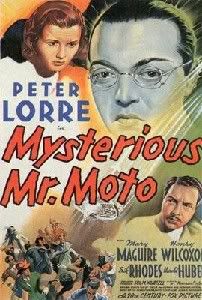 This was the second of the eight-picture Mr. Moto series I watched, and part of a four-movie set recently released series DVD. (Hopefully the other films will follow soon.) After the first film (Think Fast, Mr. Moto), I kind of gave up on the idea of watching the films in order, since I doubted there was much continuity between them. The Mysterious Mr. Moto proved to be the fourth film in the series, per the IMDB, and there was indeed little to suggest that I had missed anything by not watching the second and third entries first.
This was the second of the eight-picture Mr. Moto series I watched, and part of a four-movie set recently released series DVD. (Hopefully the other films will follow soon.) After the first film (Think Fast, Mr. Moto), I kind of gave up on the idea of watching the films in order, since I doubted there was much continuity between them. The Mysterious Mr. Moto proved to be the fourth film in the series, per the IMDB, and there was indeed little to suggest that I had missed anything by not watching the second and third entries first.
The good news is that there is no evident deterioration in the series between the first and fourth film. If anything, it improves on the first film in many ways. The budget is still quite good, if not inappropriately extravagant, as indicated by the scenes in an English pub. This set is quite a bit more elaborate and far better stocked with extras than it would be in a cheapie movie (such as the later Charlie Chan movies). The Mysterious Mr. Moto might be the fourth Moto film churned out in less than two years, but obviously the people behind it were still interested in making good pictures.
By now, as I assumed after seeing the first film, Mr. Moto (Peter Lorre) has become a bit more standardized as a character. He is indeed at this point a cop with Interpol rather than a private citizen, and less prone to kill people left and right. Even so, it’s clear that even if Moto was created following the success of Charlie Chan, in both print and in film, the characters are much different.
Whereas Chan is basically a classic detective of the Sherlock Holmes / Ellery Queen mode, Moto is more of a spy-type character, working undercover, wearing disguises, and engaging in physical combat on a regular basis. Moto is really more of an action lead. And while he does the ‘quiet, sedate Oriental’ thing, much like Chan, it’s clear that in Moto’s case it is entirely an act, meant to make an advantage of the way whites tend to underestimate him because of his race. Whenever another character, especially a white, in on the screen with him, Moto is always smiling and obsequious. When he’s alone, however, the mask be can seen to slip, even if only briefly.
Running a lean 61 minutes (who lethargic modern movies seem when watching these old programmers!), the fourth entry in the series actually improves in several ways on the original. First, Moto is much more the focus of things, and conversely the obligatory romantic leads are given much less screentime than the couple in the first film. (I have to admit, the fact that I found the female lead quite attractive probably helped too.)
The film opens with the escape of two killers from Devil’s Island. However, one of the escapees is in fact the undercover Mr. Moto, who has helped convict Paul Brissac (familiar character actor Leon Ames) escape so as to get into his confidence. Back in London, Moto learns that Brissac is part of the League of Assassins (or something of the sort), and that they are targeting pacifist industrialist Anton Darvak. As usual, the ‘mystery,’ which in this case involves the secret identity of the group’s leader, is perfunctory at best, and easily figured out. (The way that the guy allows his identity to be learned is also just silly, as it involves him for no real reason revealing himself to his henchmen for the first time.)
The real reasons to watch the film are to see Moto in action, playing in the middle between the killers and the interfering local cops, dodging numerous attempts on his life, and as usual engaging in a pretty good judo scuffle at the end of the movie. Kudos again to the stunt work, as even with my practiced eye and intent to spot the change, I could usually just barely tell when stuntman Harvey Parry was substituted for Lorre.
The DVD for this film, again available (as of now) only as part of the first Mr. Moto set, also features a short documentary on director Norman Foster, who directed and scripted six of the eight Motos. Foster had a long career as a director, including a lot of TV works on very popular shows like Batman, The Green Hornet and Disney’s manic fad-creating Davy Crockett. This was a well put together piece, although I was disappointed at the way it sped past his involvement with the Moto series.
